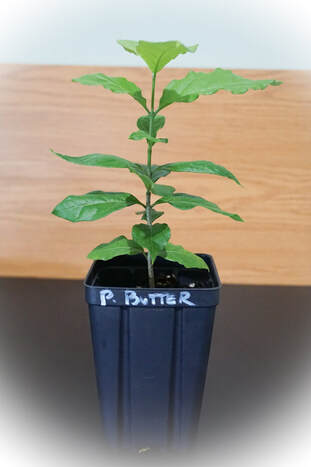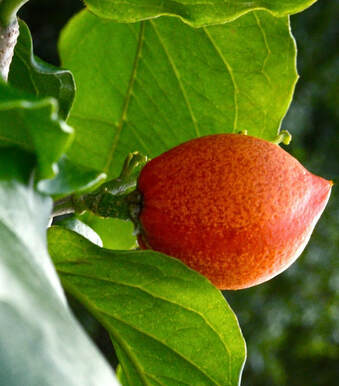Fruit Description & Taste
Peanut Butter fruits are oblong shaped fruit with thin skin that turns from orange to deep red when fully ripe. The pulp of the Peanut Butter fruit is very thick and somewhat sticky and surrounds a large central seed. The fruit offers an aroma and flavor similar to that of peanut butter. Ripe Peanut Butter fruits must be harvested immediately to prevent them from spoiling on the tree. The delicate soft fruit is not suitable for shipping.
Both the skin and pulp of the Peanut Butter fruit are edible and popularly eaten fresh. The pulp can be combined with milk and made into a milkshake, or it can be added to cakes and pastries. The fruit is also popularly made into preserves such as jams and jellies. Once ripe, Peanut Butter fruit should be refrigerated and used within a few days or it can be separated from its seed and frozen. The seed is not edible!
Peanut Butter fruits are oblong shaped fruit with thin skin that turns from orange to deep red when fully ripe. The pulp of the Peanut Butter fruit is very thick and somewhat sticky and surrounds a large central seed. The fruit offers an aroma and flavor similar to that of peanut butter. Ripe Peanut Butter fruits must be harvested immediately to prevent them from spoiling on the tree. The delicate soft fruit is not suitable for shipping.
Both the skin and pulp of the Peanut Butter fruit are edible and popularly eaten fresh. The pulp can be combined with milk and made into a milkshake, or it can be added to cakes and pastries. The fruit is also popularly made into preserves such as jams and jellies. Once ripe, Peanut Butter fruit should be refrigerated and used within a few days or it can be separated from its seed and frozen. The seed is not edible!
Nutritional Value
Peanut Butter fruit was the focus of a 2013 study in Brazil to determine the fruit’s antioxidant potential. Studies proved the fruit to be an excellent source of carotenoids, specifically lycopene offering nearly ten times that found in tomatoes.
Geography & History
Peanut Butter fruit is native to the South American Andes region where it is still predominately grown today. Additionally, it is grown by rare fruit enthusiasts in Australia as well as in the United States. The tree is popular and grows well in Florida, California, and Hawaii. Trees prefer warm weather, and full sun exposure though can tolerate partially shaded conditions. When grown in warm climates Peanut Butter fruit trees will consistently set fruit with each flower stem producing two fruits. Here in South Florida is not uncommon to see three crops of fruit per year.
USDA hardiness zones
10
Uses
Fruit
Height
10-15 ft (3.05-4.57 m)
Plant habit
Shrub or tree like; starts fruiting within 2-3 years from seed
Growth rate
Moderate
Leaves
Wavy at the margins; underside slightly hairy; simple, entire, opposite
Flowers
Arranged in racemes
Fruit
Drupe; round, dark red, rich, sweet flesh; texture similar to peanut butter
Season
Summer
Light requirement
Sun, part shade
Soil tolerances
Prefers fertile with organic matter
pH preference
6-7.6
Drought tolerance
Prefers moist soil
Cold tolerance
28 °F (-2 °C)
Click here to visit our online store:
10
Uses
Fruit
Height
10-15 ft (3.05-4.57 m)
Plant habit
Shrub or tree like; starts fruiting within 2-3 years from seed
Growth rate
Moderate
Leaves
Wavy at the margins; underside slightly hairy; simple, entire, opposite
Flowers
Arranged in racemes
Fruit
Drupe; round, dark red, rich, sweet flesh; texture similar to peanut butter
Season
Summer
Light requirement
Sun, part shade
Soil tolerances
Prefers fertile with organic matter
pH preference
6-7.6
Drought tolerance
Prefers moist soil
Cold tolerance
28 °F (-2 °C)
Click here to visit our online store:
|
|
* FDA Disclaimer
The products and statements made about specific plants or products on this web site have not been evaluated by the United States Food and Drug Administration (FDA) and are not intended to diagnose, treat, cure or prevent disease. All information provided on this web site or any information contained on or in any product label or packaging is for informational purposes only and is not intended as a substitute for advice from your physician or other health care professional. You should not use the information on this web site for diagnosis or treatment of any health problem. Always consult with a healthcare professional before starting any new vitamins, supplements, diet, or exercise program, before taking any medication, or if you have or suspect you might have a health problem.
Advertising Disclosure:
Pepesplants.com is a participant in the Amazon Services LLC Associates Program and also Googles affiliate advertising program. The programs provide a means for web sites to earn revenues from advertising and or sales.
Content Disclosure
Use all information on this site at your own risk.
The content here is based on the publishers personal experience in the green industries.
Although every reasonable effort has been made to ensure the accuracy of the information contained on this site, absolute accuracy cannot be guaranteed. This site, and all information and materials appearing on it, are presented to the user "as is" without warranty of any kind, either express or implied
The products and statements made about specific plants or products on this web site have not been evaluated by the United States Food and Drug Administration (FDA) and are not intended to diagnose, treat, cure or prevent disease. All information provided on this web site or any information contained on or in any product label or packaging is for informational purposes only and is not intended as a substitute for advice from your physician or other health care professional. You should not use the information on this web site for diagnosis or treatment of any health problem. Always consult with a healthcare professional before starting any new vitamins, supplements, diet, or exercise program, before taking any medication, or if you have or suspect you might have a health problem.
Advertising Disclosure:
Pepesplants.com is a participant in the Amazon Services LLC Associates Program and also Googles affiliate advertising program. The programs provide a means for web sites to earn revenues from advertising and or sales.
Content Disclosure
Use all information on this site at your own risk.
The content here is based on the publishers personal experience in the green industries.
Although every reasonable effort has been made to ensure the accuracy of the information contained on this site, absolute accuracy cannot be guaranteed. This site, and all information and materials appearing on it, are presented to the user "as is" without warranty of any kind, either express or implied
Site created and managed by Pepe's Fruit Trees. Copyright 2024 - All Right Reserved
Site created and managed by Pepe's Fruit Trees. Copyright 2024 - All Right Reserved







